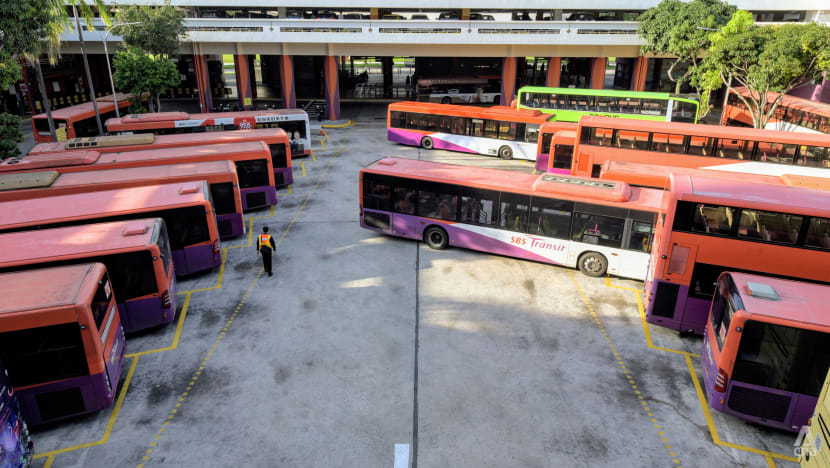Eligible lower-income households to get S$30 public transport vouchers to cope with rise in bus, train fares
Bus and train fares will increase by up to 5 cents from Dec 26 due to rising energy costs, says the Public Transport Council.

Buses parked at Bishan Bus Interchange on Sep 3, 2021. (Photo: Try Sutrisno Foo)
SINGAPORE: A total of 600,000 public transport vouchers worth S$30 each will be made available to lower-income households to help them cope with rising bus and train fares which will kick in from Dec 26.
This comes after the Public Transport Council’s (PTC) decision to increase fares by 2.9 per cent in its annual fare review exercise due to rising energy prices.
The vouchers can be used to top up fare cards or buy monthly concession passes, said the Ministry of Transport (MOT) and the People’s Association (PA) in a joint news release on Wednesday (Oct 12).
Similar to last year’s Public Transport Vouchers exercise, it will cover resident households with a monthly household income per person of not more than S$1,600.
The vouchers will be disbursed in two stages.
In the first stage, households that received the vouchers in the 2021 exercise and continue to meet the income eligibility criteria will automatically receive a notification letter through the mail, without having to apply. This will be done by end-December.
In the second stage, which will start from early 2023, households that meet the income criteria but did not receive a voucher in the first stage can apply for them online or in person at their local community centres or community clubs.
All vouchers must be redeemed by Mar 31, 2024.
RISING TRANSPORT COSTS
From Dec 26, adult card fares will increase by 4 cents for journeys up to 8.2km long. For journeys longer than 8.2km, fares will increase by 5 cents.
Meanwhile, the increase in concession card fares will be capped at 1 cent per journey to keep fares lower for students, senior citizens, lower-wage workers, and people with disabilities.
There will be no change to the prices of monthly concession passes, adult monthly travel passes and bus cash fares.
The overall fare adjustment of 2.9 per cent translates to an increase in fare revenue of about S$50.3 million a year, with SBS Transit Rail and SMRT Trains set to see an increase of S$7.4 million and S$15.4 million in annual revenue respectively.
Fare revenues for bus and Thomson-East Coast Line collected by the Land Transport Authority (LTA) will increase by S$27.5 million to sustain the cost of their operations, including service payments to the operators.
However, PTC said the revenues "will not be sufficient to cover the costs of operating high-quality public transport services".
After taking into account government support for COVID-19, SBS Transit’s train segment reported a loss of tens of millions of dollars while SMRT Trains recorded an operating profit of S$16 million in their latest financial year.
Both operators had applied for a fare adjustment of 13.5 per cent, citing escalating costs as among the reasons for the increase.
To cover the increased costs due to the doubling of energy prices and mitigate the impact of fare increases on commuters, the Government is providing an additional S$200 million in subsidies in 2023. This is on top of the current subsidies of more than S$2 billion per year to run bus and train services.
“The S$200 million support covers the carried-over quantum of 10.6 percentage points and shields commuters from the brunt of the fare increases, given the cost of living concerns,” said the Ministry of Transport in a press release on Wednesday.
It added that this has enabled adult fare increases to be capped at 5 cents per journey.
Speaking at a press conference on Wednesday, PTC chairperson Janet Ang said the council had decided on the 2.9 per cent fare increase to ensure public transport remains affordable while taking into account inflation.
“We deliberated very hard and debated internally how far should we go - because of public transport operations costs - in order to enjoy the quality of service,” she said.

















